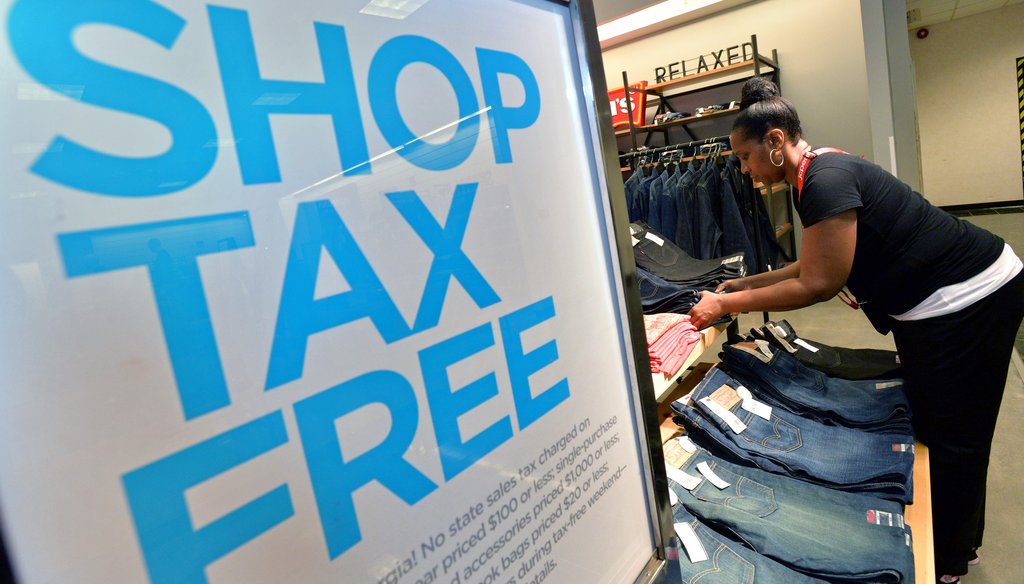



A worker arranges a display of clothing at JC Penney at Northlake Mall before the sales tax holiday in 2013. File photo by Hyosub Shin / AJC
State lawmakers have struggled this legislative session, trying to figure out how to raise up to $1 billion a year to fund statewide transportation needs.
The House came up with a plan. But the Senate approved a very different version of House Bill 170, killing more than $200 million in fees associated with the plan.
Lawmakers reached a deal late Tuesday that will get close to the original $1 billion goal. The compromise also killed a Senate attempt to elminate Georgia’s tax holidays that nix sales taxes on certain back-to-school and energy efficient items.
The president of the Georgia Retail Federation recently wrote an editorial that warned eliminating the popular incentive could curb the state’s economic activity.
An association-funded study showed that "consumers often used the additional savings from their tax-free purchases to buy additional items," Rick McAllister wrote in an editorial in the Savannah Morning News.
That in turn creates demand for additional workers, he added, either hired as temporary labor or paid through increased overtime.
"We recognize the value these sales tax holidays have in saving families money while also producing needed jobs," McAllister wrote.
Could it be that those perks exist and wold have been lost in lawmakers’ scramble to find cash for roadwork? PolitiFact Georgia decided to check.
Luckily, Georgia has a history of years with, and without, the holidays. The state first exempted clothes, school supplies and computers from state and local sales taxes for two weekends in 2002. It added a similar holiday for energy-efficient appliances in 2005.
Conventional wisdom held that the breaks were at best a wash for state coffers, while remaining popular among voters. But the state canceled the holidays in 2010, due to worries about revenue declines.
McAllister said the association hired the consulting firm, Washington Economic Group, to look at retailers’ books for all of the years to divine the impact.
Researchers found that the years with the sales tax holidays showed an increase in all sales, not just on exempted items, for that entire quarter. In the years without the break, sales were generally stagnant or lower.
Indeed, the report concluded that sales tax revenue is actually up for governments during holiday years, because of those additional sales.
"There is a stimulus effect in general," McAllister said.
That runs counter to an annual analysis by the Tax Foundation, a right-leaning nonprofit that examines the tax holidays nationwide by reviewing anecdotal and scholarly reports.
Those findings have never waned: shoppers mostly adjust when they make purchases but rarely buy significantly more or less because of breaks.
"In some states, you will see some element of impulse purchases," said Joseph Henchman, the foundation’s vice president of state projects and author of the annual report. "Generally, it’s just a shift in when people buy things. People don’t typically buy that much more for just 5 or 6 percent off."
In other words, one analysis finds tax holidays prompt shoppers to buy more. A broader study concludes the breaks are ineffective in spurring any significant bump.
So which is it? Probably more the latter, said Robert Buschman, a senior research associate at the Fiscal Research Center at Georgia State University.
Buschman, an economist, has studied the specifics of the holidays in Georgia. He acknowledged at least one study that found some people do make big-ticket purchases such as computers because of the tax break and sales prices that tend to accompany the holiday.
But his 2011 study on the Peach State showed that Georgians behave the way other consumers do during the tax holidays: They buy mostly what they would have bought anyway, just during one weekend.
A model that only counts sales in that period would show an increase, the way the association’s report does. But that’s because it assumes there is not an offsetting reduction in another period – which is how most shoppers behave.
"Obviously consumers do go shopping with the sales tax holidays. But if not for the holiday, would they have gone to back-to school sales anyway," Buschman asked. "Most likely they would."
Most studies then, including one specific to Georgia, show that the sales tax holidays do increase sales. But there is not much of an incremental increase over what shoppers would spend anyway, if not for the break.
The retail association’s consultants failed to take all of that into consideration. McAllister claimed that the tax holidays spur sales and boost the economy.
It’s true that the breaks are popular with shoppers, who do respond to the sales. But the overwhelming evidence is that people are buying what they would need with or without the break.
We rate McAllister’s claim Half True.
The Atlanta Journal-Constitution, "Transportation plan passes Senate, but not without cuts," March 20, 2015
The Atlanta Journal-Constitution, "Senate lawmakers make big changes to Ga. transportation bill," March 17, 2015
Savannah Morning News, "Don’t zap Georgia’s sales tax holidays," March 27, 2015
Washington Economic Group, An Analysis of the Costs and Benefits of a Sales Tax Holiday in the State of Georgia, Jan. 5, 2012
Tax Foundation, Sales Tax Holidays: Politically Expedient but Poor Tax Policy 2014, July 31, 2014
Robert D. Buschman, "Sales Tax Holidays and Revenue Effects in Georgia," Fiscal Research Center at Georgia State University, March 2011
Phone interview, Rick McAllister, president, Georgia Retailers Association, March 30, 2014
Phone interview, Joseph Henchman, vice president of state projects, Tax Foundation, March 30, 2014
Phone interview, Robert D. Buschman, senior research associate, Fiscal Research Center at Georgia State University, March 30, 2014
In a world of wild talk and fake news, help us stand up for the facts.
